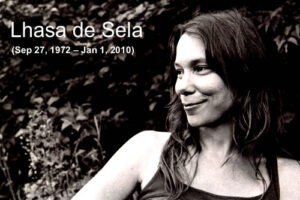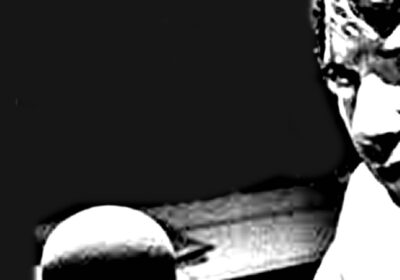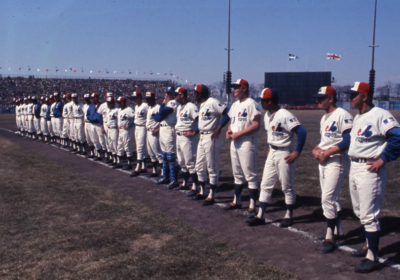Lhasa de Sela: Her songs, like her life, went everywhere
by Robert Everett-Green
source: Globe and Mail
…………………………..
In one of her song videos, Lhasa de Sela plunges feet-first to the bottom of a lake, where she seems to have no more trouble walking than if she were in her own home. Lhasa (as we all called her) was always getting down to the bottom of something, well beyond the depths most of us would be able or willing to go.
 Her voice had an exceptionally wide range of colours, but in all shades it was a naked voice. It challenged you to follow her to that region in the heart where she moved so freely, and to see afterward if you could still keep your mask in place.
Her voice had an exceptionally wide range of colours, but in all shades it was a naked voice. It challenged you to follow her to that region in the heart where she moved so freely, and to see afterward if you could still keep your mask in place.
Her death on the weekend, of breast cancer at age 37, still seems to me unbelievable, though part of the power of this Montrealer’s work came from her instinctive familiarity with the end of things. Her songs were permeated by the awareness that each moment, whether it be filled with sadness or happiness or rage, is crumbling under our feet.
Her outlook was profoundly nomadic, in life and in art. A Mexican-American who moved to Montreal in the early 1990s, she spent her childhood rambling around the United States in her family’s converted school bus, and at the height of her early success she ran away to sing with a small touring circus in Europe. Her music travelled a great distance in the span of 12 years and three albums, as she sifted and distilled sounds and ideas that resonated with her, no matter where they came from. When they no longer suited, she fearlessly let them go.
It must have been tempting, after her 1997 debut disc La Llorona sold a half-million copies, to carry on in that Spanish-language album’s flamboyant, guttural style. But she kept moving, and by the time her English third album ( Lhasa ) arrived last spring, her writing had become as pure as folk song, and her singing as simple as breathing.
In her performances, she would often approach the microphone like a child performing a ritual, sing with such focused intensity as to vanish completely into her song, then re-emerge with an elfin grin. Even when she sang a slow number, I found it hard to keep up with the rapid changes of feeling she could pass through in a single phrase.
La Llorona seemed to come from nowhere, in terms of what was happening at the time in Montreal, but in retrospect it was an ice-breaker that freed up conventional ideas of what world music was, and what Canadian music could be. Without drawing lines too directly, I think her fiercely selective plundering and mixing of styles helped clear the way for mongrel-music bands such as Arcade Fire.
During my one long conversation with her, after The Living Road came out in 2003, Lhasa told me that her father used to say that from the fetus’s point of view, birth must feel like the end of the world. Dear Lhasa, I hope that the end you encountered on the weekend was just like that: an illusion on the way toward new adventure.






